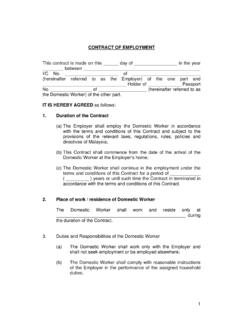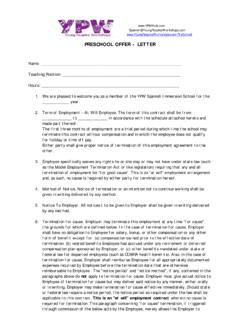Transcription of BRAZIL - OECD.org
1 OECD/IDB EPL Database: September 2015 1 BRAZIL Regulations in force on 1 January 2012 1: Notification procedures in the case of individual dismissal of a worker with a regular contract Oral or written notification in the case of misconduct. In the case of dismissal for any other reason (sem justa causa), no prescribed procedure but notice must be certain and is generally written. 2: Delay involved before notice can start Once notice is given, termination becomes effective upon expiration of the respective period of notice. If the employer reconsiders the dismissal before the end of the notice period, the worker may accept or reject that decision.
2 If the worker accepts reconsideration or continues to work after the notice period expires, the employment contract will remain valid as if no notice had been given. 3: Length of notice period at different tenure durations (a) Advanced notice of 8 days, if weekly paid and less than one year of job tenure in the case of dismissal without justified reason (sem justa causa). Advance notice of at least 30 days for workers either paid monthly or twice a month or with at least one year of job tenure in the case of dismissal without justified reason. This is increased by three days per year of service until a maximum of 90 days (Law of October 13, 2011; art 487 of the Consolidation of Labour Laws).
3 Calculations (for EPL indicators): 9 months tenure: month; 4 years: months 20 years: 3 months 4: Severance pay at different tenure durations (a) No severance pay in the case of dismissal with justified reason (com justa causa), which essentially corresponds to employee s misconduct. However, the employer deposits 8% of the worker's monthly earnings into a saving account in the worker's name in the Fundo de Garantia po Tempo de Servico (FGTS), which can be accessed by the worker, inter alia, in the case of dismissal not due to misconduct (sem justa causa). Moreover, in this case, private-sector workers are also entitled to an indemnity (multa) of 40% of the total amount deposited in their name in the FGTS.
4 The indemnity is paid over and above the deposits in the worker's FGTS account during the employment contract . In addition, employers must pay as social contributions 10% of the total amount deposited in the FGTS (Decree 3914, 11-09-2001). Note that this applies only as of the fourth month of the employment contract , the first three months being considered as a probationary period. Calculation (for EPL indicators): 40%*8%*number of months of employment 5: Definition of unfair dismissal (b) The following cases constitute ground for dismissal with justified reason (com justa causa): i) dishonest acts; ii) immoral conduct or misbehaviour; iii) regular conduct of business by the worker for his own or another person s account, without the employer s permission, in competition with or to the detriment of the employer; iv) criminal conviction, unless the sentence has been suspended; v) slothfulness or negligence; vi) habitual or on-the-job drunkenness.
5 Vii) breach of company secrecy; viii) breach of discipline or insubordination; ix) abandonment of the job; x) physical or verbal aggression in the workplace against any person, except in selfdefence or in defence of third parties; xi) physical or verbal aggression against the employer or a superior, except in self-defence or in defence of third parties; xii) habitual gambling. Acts prejudicial to national security, if proven in administrative proceedings, also constitute grounds for fair dismissal. However, employers can always dismiss workers with no justified reason (sem justa causa) provided that advance notice is respected and severance payments are observed, except in cases of discrimination and of those categories of employees enjoying job stability ( pregnant women, member of a trade union board and workers' representatives on the Internal Accident Prevention Commission (CIPA)).
6 In the case of dismissal of workers hired before 1979 who have not opted for the FGTS system, courts might order full compensation or reinstatement 6: Length of trial period (c ) 3 months 7: Compensation following unfair dismissal (d) In the case of dismissal not due to misconduct (sem justa causa), only prescribed notice and indemnities are due. However in the case of dismissal of workers hired before 1979 who have not opted for the FGTS system, if no reinstatement is ordered, prescribed compensation is entirely paid by the employer 8: Reinstatement option for the employee following unfair dismissal (b) The indemnity paid through the FGTS is usually the only remedy.
7 However reinstatement is available in the case of dismissal of workers hired before 1979 who have not opted for the FGTS system. If a serious offence is not duly established, they shall be reinstated or be awarded compensation if the Court declares that reinstatement is not advisable. The same rules apply to those categories of employees enjoying job stability ( pregnant women, member of a trade union board and workers' representatives on the Internal Accident Prevention Commission (CIPA)). If serious reasons for dismissal are not recognized by the Labour Court, they have the right to be reinstated.
8 Calculation (for EPL indicators): since reinstatement is still possible for workers hired before 1979 who have not opted for the FGTS system. 9: Maximum time period after dismissal up to which an unfair dismissal claim can be made (e) Maximum time period after dismissal notification up to which a claim concerning dismissal can be made is 24 months (Constitution, Art. 7 XXIX) 10: Valid cases for use of standard fixed term contracts A contract for a specified period is a contract in which duration is fixed in advance or which depends upon the performance of specified services or on the occurrence of a particular event, the approximate date of which can be foreseen.
9 Contracts for a specified period are valid only if they govern services whose nature or transitional character justifies the fixing of their duration in advance, transitional activities carried out by the undertaking, and contracts of a probationary nature (Art. 443 Consolidated Labour Law) 11: Maximum number of successive standard FTCs (initial contract plus renewals and/or prolongations) May be extended once. OECD/IDB EPL Database: September 2015 2 12: Maximum cumulated duration of successive standard FTCs Not exceeding 2 years. 13: Types of work for which temporary work agency (TWA) employment is legal Work in urban areas to meet a temporary or seasonal need for regular and permanent employees, or to cope with an extraordinary workload increase.
10 14: Are there restrictions on the number of renewals and/or prolongations of TWA assignments? (f) No, within the 3 month limit unless authorised by the Ministry of Labour and Employment. 15: Maximum cumulated duration of TWA assignments (f) 3 months unless authorised by the Ministry of Labour and Employment. 16: Does the set-up of a TWA require authorisation or reporting obligations? A temporary work agency must be registered with the Ministry of Labour and Employment. The agency must comply with any requests for information made by the Ministry. 17: Do regulations ensure equal treatment of regular workers and agency workers at the user firm?


















